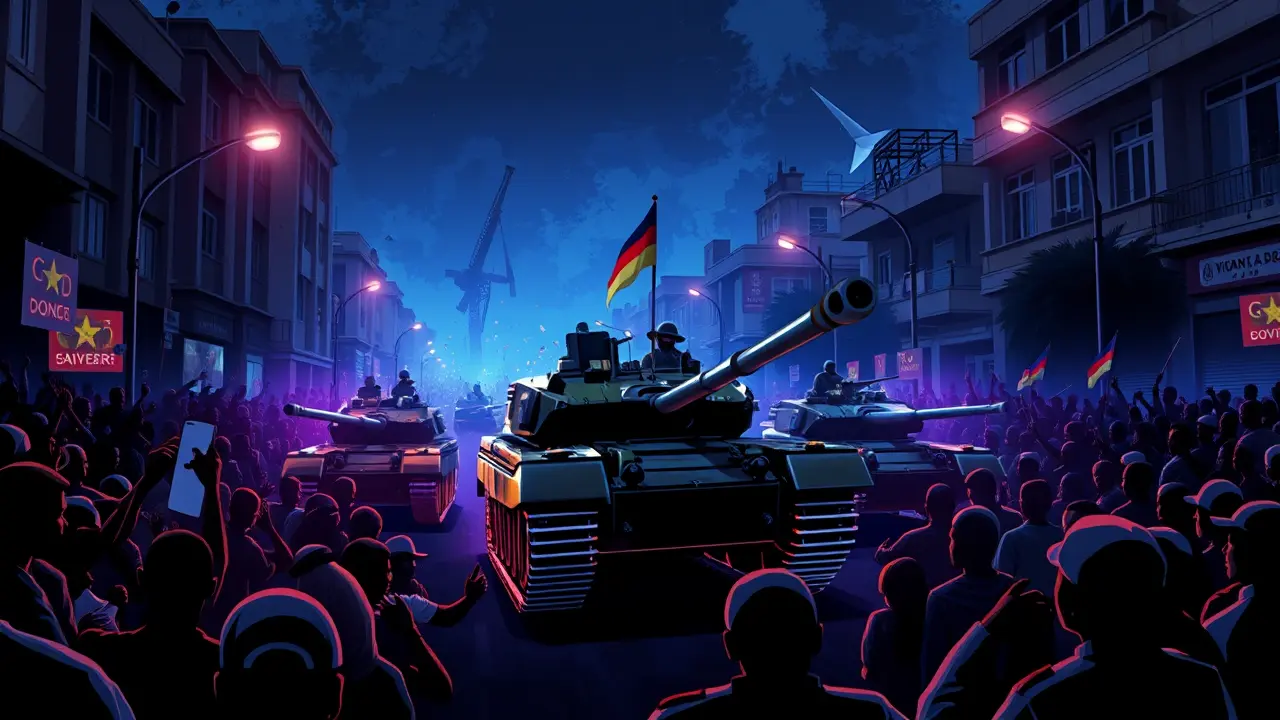Military Unit Seizes Power in Madagascar Amid Cheering Crowds
The tanks rolled into the capital not with the thunder of opposition, but with the roar of public acclaim, a stark departure from the typical coup narrative that usually unfolds under a cloak of midnight secrecy and terrified silence. In the heart of Antananarivo, the scene was one of surreal celebration, not fearful submission, as crowds thronged the streets, their cheers echoing off colonial-era facades, welcoming the elite army unit that had just announced its seizure of power from President Andry Rajoelina.This is not a simple military putsch; it is a political earthquake with its epicenter in the public square, a dramatic rupture in Madagascar's fragile democratic fabric that demands immediate, urgent analysis. The unit in question, the Malagasy Gendarmerie's Special Forces—a highly trained cadre with a reputation for discipline and a history of operating with a degree of autonomy—moved with startling speed, securing key government buildings, the national broadcast station, and military headquarters in a series of coordinated, precise maneuvers that began in the pre-dawn hours.Initial reports, still fragmented and filtering through a temporarily unstable communications network, suggest the action was triggered by a profound and rapidly escalating rift between the presidential administration and the military high command over the handling of the nation's crippling economic crisis and allegations of deep-seated corruption that have left over 75% of the population living in poverty despite the island's immense mineral and ecological wealth. President Rajoelina, who first came to power himself in a 2009 coup backed by the army before being elected in 2018, reportedly attempted to placate the military brass just yesterday in a closed-door meeting that evidently failed catastrophically, a classic historical parallel to the fall of regimes that forget the allegiance of their own protectors.The sight of soldiers being handed flowers and embraced by civilians points to a deep and festering popular discontent that the military appears to be leveraging, a dangerous gambit that recalls moments in other post-colonial African states where the army positioned itself as the savior from a corrupt political class, only to usher in periods of extended junta rule and international isolation. The international reaction is now the critical next domino to fall; we are monitoring channels from the African Union, which has a strict anti-unconstitutional-change-of-government protocol, and from former colonial power France, which maintains significant economic and strategic interests in the Indian Ocean region, with statements expected within hours that will likely condemn the action and call for an immediate restoration of constitutional order.The immediate consequences are already manifesting: the Antananarivo stock exchange has halted all trading, the Malagasy ariary has plummeted against the euro in unofficial markets, and regional airlines are suspending all flights into Ivato International Airport, effectively sealing off the nation. The critical question that every analyst from Pretoria to Paris is asking is whether this is a definitive power grab or a high-stakes negotiating tactic to force a political reset; the presence of cheering crowds provides a powerful, if volatile, mandate, but the history of such interventions warns that the euphoria of the street is often fleeting, and the reality of governing a nation on the brink is an infinitely more complex task than seizing its television stations.The risk of factional splits within the military itself remains a palpable threat, and the potential for opportunistic violence by criminal elements or political militias in the power vacuum is high. This is a breaking story of the highest magnitude, a live, unfolding crisis that will redefine the future of one of the world's most unique biodiversity hotspots and test the resilience of democratic institutions across the Southern African Development Community. All eyes are now on the next broadcast from the military commanders and the swift, decisive response from a watching world.
Latest News
The charts are whispering what the true believers have felt in their bones for weeks—Dogecoin is carving out a bottom.
17 hours ago5 comments
The Institute for Fiscal Studies has thrown a stark warning onto Rachel Reeves's desk, urging the Chancellor to confront a potential £22 billion shortfall in
17 hours ago3 comments
Alright, let's break down this absolute heater of a performance from the Chicago Blackhawks, because if you missed this one, you missed a party.
17 hours ago5 comments
The ice was hot last night in the NHL, folks, serving up a slate of games that felt less like a regular season Tuesday and more like a playoff preview with a
18 hours ago3 comments
The XRP chart is painting a tantalizing picture for those with the stomach to withstand the relentless pressure from crypto's leviathans.
18 hours ago4 comments
It’s in the small shifts, the quiet recalibrations of a Thursday morning, where the most meaningful change often takes root.
18 hours ago4 comments
In a move that sent ripples of quiet confidence through the crypto ecosystem, blockchain intelligence firms tracked a monumental treasury allocation from
18 hours ago4 comments
In a move that would have drawn a nod of approval from historical figures like Churchill, who understood the delicate balance of power within democratic
18 hours ago2 comments
JA
Jamie Larson123k1 day ago
wow the public reaction here is so different from what you usually see, what do you guys think this means for the people living there? would love to hear more thoughts on this
0
JA
Jamie Lawson123k1 day ago
posting this at 2am for the algorithm gods to finally show me a coup that has a soundtrack of cheering crowds instead of gunfire idk man this timeline is wild
0
JA
Jamie Larson123k1 day ago
idk this feels like a movie script tbh but smh at the cheering crowds, that never ends well
0
JA
Jamie Wilson123k2 days ago
smh the public cheering for a coup is a wild but telling detail idk what to think tbh
0
